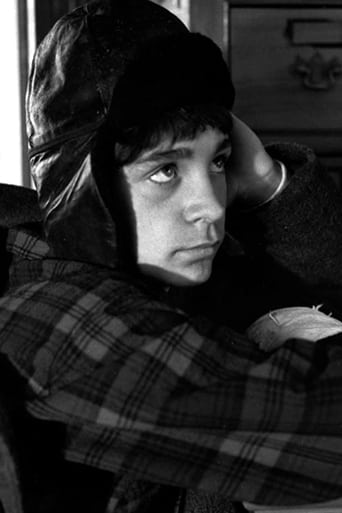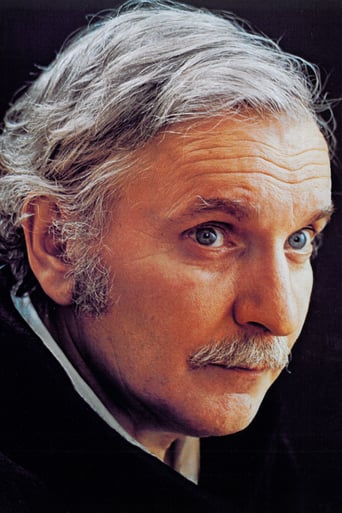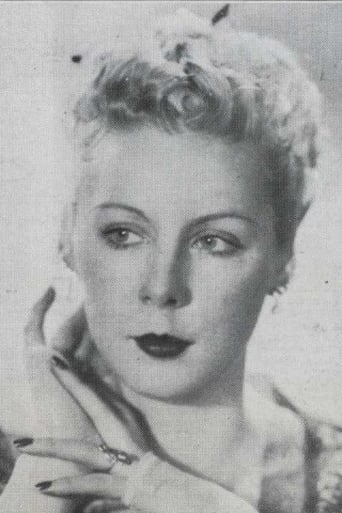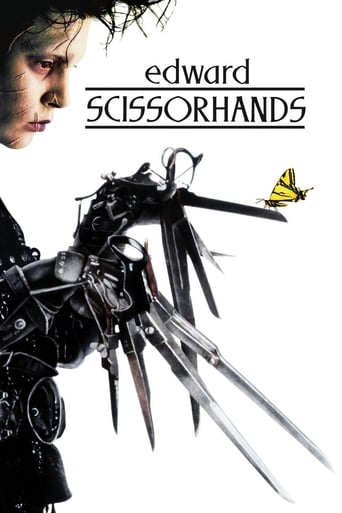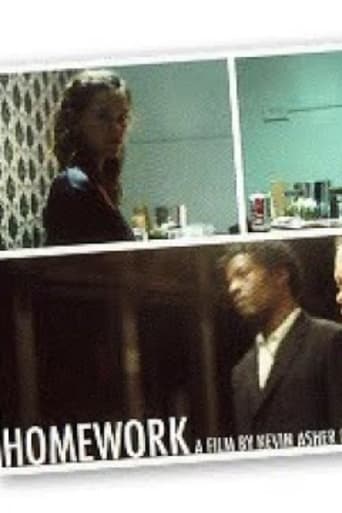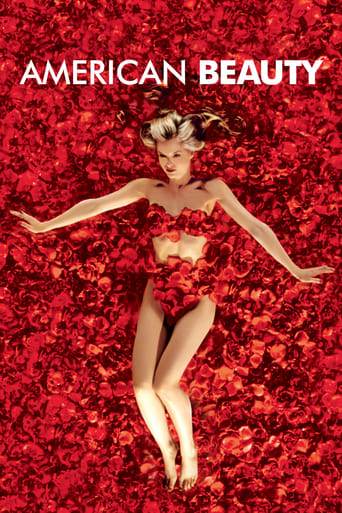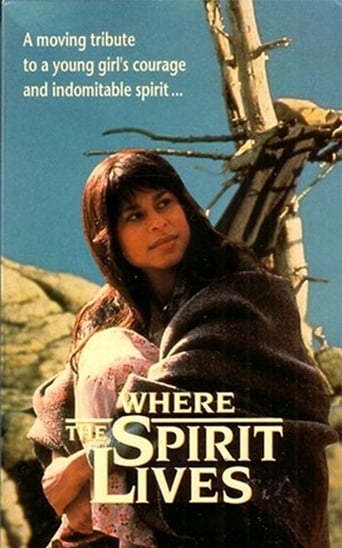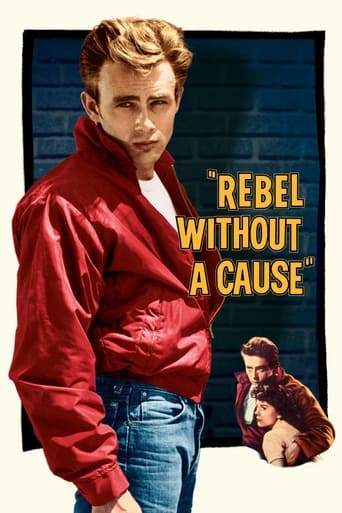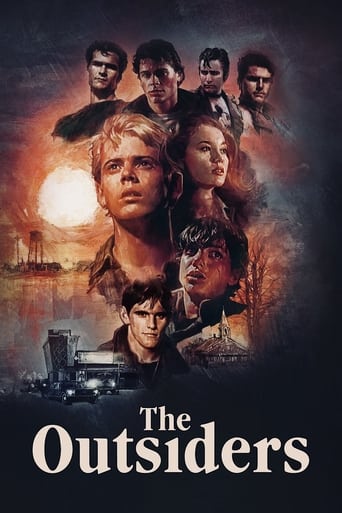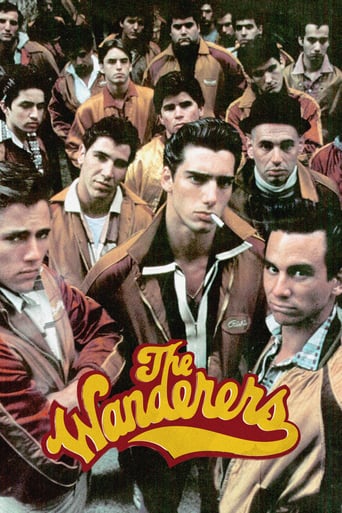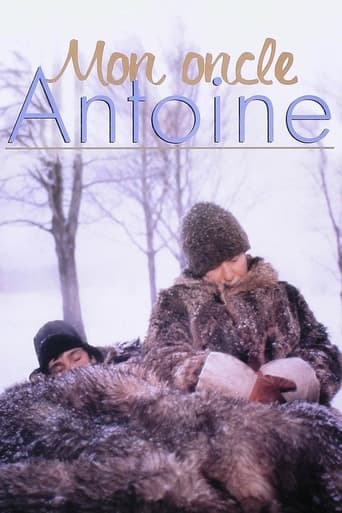
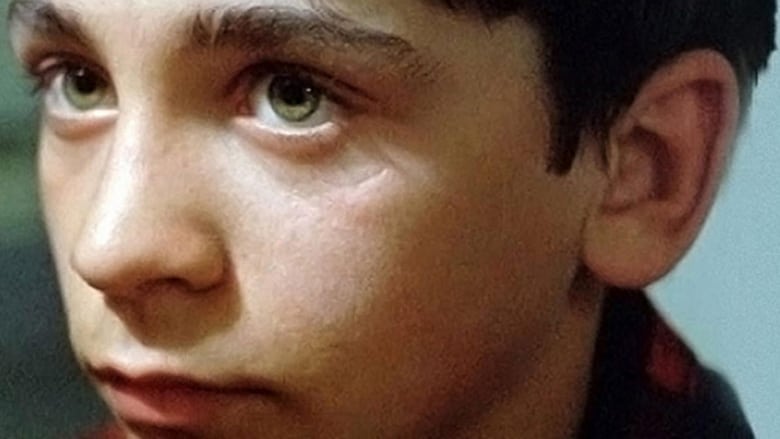
Mon oncle Antoine (1972)
Set in cold rural Quebec at Christmas time, we follow the coming of age of a young boy and the life of his family which owns the town's general store and undertaking business.
Watch Trailer
Cast


Similar titles
Reviews
The film makes a home in your brain and the only cure is to see it again.
The first must-see film of the year.
Amazing worth wacthing. So good. Biased but well made with many good points.
The movie's not perfect, but it sticks the landing of its message. It was engaging - thrilling at times - and I personally thought it was a great time.
The flip side of the jollier Christmas is this sobering, low-key, funereal Eve day slice-of-life spent in a blink-and-you-will-miss mining town, where a boy orphan named Benoit (Jacque Gagnon) helps his "uncle" Antoine (Jean Duceppe) and "aunt" Cecile (Olivette Thibault), their teenage boarder, Carmen (Lyne Champagne), and clerk/assistant, Fernand (Claude Jutra, also director of this film) prepare the general store for its holiday-themed opening, complete with model manger scene in the store window, lights, and festive décor. Prior to this, Benoit helped Antoine (also an undertaker) prepare a miner for a Catholic funeral (Fernand dutifully receiving orders from Antoine and obeying without being sore as well). Benoit even serves as a bored altar boy going through the motions of a day as a priest rarely pays him much mind as he himself does his deeds quietly. The film hints at a tension between the miners of the town and the mine that hasn't given them raises and serves as a beacon of burden resting high above their home on a mountain nearby, like a looming thundercloud. Then there are the revelations that come as the day settles and Benoit does some growing up. Like how a drunken Antoine just unleashes his disappointments (no real child, a job in a poverty-stricken town, an undertaker when he would have rather been in charge of a hotel in USA instead of a general store in a small spot in Quebec) like a gushing wound bleeding forth, having to operate the horse buggy as Antoine is useless when the casket of a dead young man falls off (Benoit has a cast on one of his arms, and his attempts to get Antoine to help him fails), and discovering Cecile and Fernand fooling around while they are embracing adulterously; these events are life-altering and unexpected. Carmen and Benoit flirting (there's even a moment of sexual awakening as a horseplay leads to Benoit copping a feel of her breast while Carmen is okay with that, until embarrassment eventually causes her to flee), and her disgusting pops showing up to retrieve her income working at Antoine's store (the poor state of the people is especially noticeable here) are a glimpse into what this blossoming woman currently has going on in her own life. But what appeared to be a marriage somewhat solid (Cecile and Antoine), the film lets us see behind the curtain, and it proves to be a façade potentially fracturing.The cold, gloomy environs of the location, a local populace beholden to a mine that is unhealthy and unappreciative to its employees (the film is set right before a strike), and the solemnity of an introverted boy rarely vocal and more introspective are significant attributes to one of Canada's most celebrated films. Set in the 40s, the director perhaps deserves particular praise for the evocation of time and place, how authentic and realistic the characters are presented (it is as if we are time-warped right into a different era), and the dreary, colorless presence of a low income, grind-it-out, discouragingly dismal everyday existence for the miners who see no real light at the end of the tunnel. The final scene where Benoit looks into the window of the mother who lost her son when he just fell ill bookends the gravity of just how difficult life in the setting is.The subplot of a miner who grows restless and tired of the job goes a logging, leaving behind his family for what he considers a brief spell, not knowing his son would soon be dead upon return. That kid is the one put in a casket by Antoine and Benoit, with the undertaker inert and almost unaffected by the loss for the family (Antoine eating away at a supper prepared by the mourning wife is rather troublesome). When Antoine later can barely stand, a pitiful mess, Benoit seems to have lost all respect for him. Later, when he sees Cecile for who she really is, Benoit seems totally defeated these people he looked up to are truly flawed and disappointing. Fernand and Cecile trying to tip-toe around what Benoit saw by appealing to him delicately, it failing miserably, proves that the kid has grown up and not duped any longer. My favorite scene has the sophisticated beauty married to the mine accountant arriving at the store looking for a corset, with the guys truly in awe of her.
Mon oncle Antoine was voted the greatest Canadian film of all time by the Toronto Festival of Festivals in 1984 and 1993. But why? Leonard Maltin, who I usually don't like, brushed this movie off with a sentence "Not bad, but nothing special." Who's right? Does it matter if the viewer is Canadian? It's true there's little wrong quality-wise with Mon oncle Antoine. It focuses on Quebec at Christmastime prior to the Quiet Revolution. Great setting with lots of possibilities for stories. The musical score works charmingly. It's a coming-of-age story about 15-year-old Benoit. The problem is that virtually nothing happens- the high point of action in this movie is when a coffin falls off a sled. Really? What's that supposed to say? If there's a message, it's cryptic. There's nothing clearly political about this movie, nothing especially unique to Canada or Quebec, and nothing valuable or surprising to learn about Duplessis' era. Without much apparently happening, there's little here you can't get from a Cornelius Krieghoff painting.So what is the best Canadian film? I can't say I've seen many but I can point to The Sweet Hereafter (1997) or even Last Night (1998) as better movies. In comparison to those, Mon oncle Antoine is competently-made but does not shine.
Explores the frontiers of extreme boredom. Life in a small Canadian town in winter as an experiment in extreme sensory deprivation. Absolutely nothing happens as viewed through the eyes of a blank, deadpan, totally uninteresting protagonist. Viewers of this film should be prepared to hallucinate in the style of "Altered States".In a groundbreaking study, David Snowden found that he could predict Alzheimer's thirty years in advance by comparing the autobiographical essays of nuns as they entered the convent. Those who eventually suffered the disease wrote in simple direct prose. The essays were quiet and contemplative with little optimism or episodes of joy.Now, why did I mention that? Perhaps , my mind begins to slowly unravel watching this interminable, autobiographical, contemplative film which shows, in simple direct style, the bleak and stoic life of a small community, living next to giant slag heaps of asbestos.This film became popular at the height of the Quebec separatist movement because of its presentation of this community as permanently wounded victims. Tragically, its writer-director was soon diagnosed with Alzheimer's disease in the early 1980s and apparently committed suicide.
Mon Oncle Antoine (1971)Despite having a heavy film industry presence (usually American productions looking for cheap locations), Canada's own gems have often gone by the wayside. We're too close to America to really for it to care enough about a film not about its own country, and too far from overseas to have the exotic flare found in European or Asian cinema. Perhaps that is why the film considered Canada's best goes so widely underseen and overlooked. Claude Jutra's classic Mon Oncle Antoine truly is one of the best Canadian films ever made. It's also one of my favourite films, period. It is now out in a lovely 2 disc package from the folks at Criterion. Set in an early 1940s Quebec asbestos mining town, it's a coming of age story over the course of a few days at Christmas time. Adolescent Benoit lives with his uncle, Antoine, his aunt, and a teenage girl, Carmen, who the family houses and employs at their store. Antoine not only owns the local general store, but is the local undertaker as well, among other things. The film floats around, with no real plot-wise direction. Events happen in a relaxed and patient fashion, not to highlight story, but to highlight the emotional development of Benoit as he transforms from a free spirited adolescent into adulthood. He experiences the sexual passions, the harsh indifferences and the cynicism of leaving childhood behind. Jutra balances light hearted humour and charm with dark pathos and sadness with a deft hand. There are playful moments between Antoine and Carmen, and comedy with the sneaky Fernand (played by Jutra himself), who runs the store for Antoine when he's not chasing the uncle's wife. There is also a moment of great triumph when Benoit and another boy throw snowballs at the mine owner as he makes his way through town giving out small gift bags for Christmas rather than raises or bonuses to the men as the soundtrack blares a score fit for a spaghetti western. On the darker side, there is a separate story where a family's father leaves the mines and heads to the logging camps. While he is away, his eldest son takes ill, and dies on Christmas Eve. Antoine is phoned to come pick up the boy's body, and Benoit insists he go along. The long sleigh ride through a snow storm offers him opportunities for mischief, but in the end leaves him with sad realizations about the nature of adulthood and those around him. Mon Oncle Antoine is certainly about the loss of innocence, but it is also more than just a story about a boy in rural Quebec. It is a parable about the coming of age of the province itself. Most of the mines were owned by either Americans or English speaking Canadians, as referenced by the film when the mine foreman speaks in English to his French workers who do not understand. The time period is the Maurice Duplessis era - he was the premier of Quebec with his Union Nationale. His party was deeply conservative, pro-business, rabidly anti-socialist (in any form), and formed deep rooted connections with the traditional Catholic clergy. He was also deeply corrupt, and reportedly a master of ballot stuffing. It's also just prior to the Asbestos Mine strikes and the Quiet Revolution. The miners voted to strike, which was deemed illegal by Duplessis, who continued to pledge unwavering support for the mine owners,. He also authorized the use of strike breakers which lead to incidents of violence. However, the miners had the widespread support of the public and the French media, and even most priests and the province's archbishop. This marked a major turning point in Quebec culture, as well as the shift to the social left in a large part of Canadian Catholicism. Separatist ideology increased dramatically.History lessons aside, the physical construction of the film, meant to evoke life in the harsh mining towns in the Asbestos region, must be recognized. The small town, shadowed by the mine hills, literally exudes its cold surroundings, yet still manages to fill its homes with undeniable warmth thanks to its characters. Jutra also uses practical, naturalistic lighting rather than normal crisp studio lighting. The sounds and senses of Canadian winters are placed front and centre by Jutra. This is how these towns are supposed to look and feel during winter. The feel of the film is not limited to Quebec culture. New Brunswick and Nova Scotia not only have massive French populations and culture, but the same woods, the same houses, the same towns. I know the feel of small harsh industrial towns - I grew up in one in Nova Scotia. They are not at all unlike the one in Mon Oncle Antoine. Most of them still look just like they did 50 years ago (if not worse). Perhaps that is one of the reasons why I love this film so much. It's the sensation of familiarity found in Eastern Canadian life and culture (which has its own very large French/Acadien population and culture.But alas, I am rambling, and fear that I could go on and on. Mon Oncle Antoine is one of the great hidden gems of the cinema. Its performances are earnest; the photography is evocative and beautiful in that cold, bleak sort of way; its direction is assured and inspired. It is a masterful portrait of childhood's twilight, and a sad but hopeful realization of the loss of innocence - a parable for the whole of Quebec.


